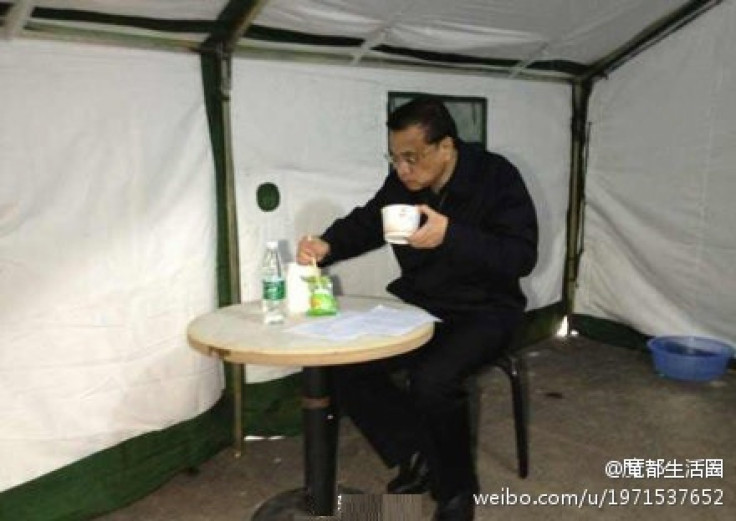Advertising Money Can’t Buy: Chinese Pickle Company Stock Surges After Premier Seen Munching On The Snack [PHOTO]

A photograph of Chinese Premier Li Keqiang on site in Sichuan after last week’s 7.0 magnitude earthquake went viral on the Chinese Web this weekend. But something else about the picture also caught the public's fancy.
The photo depicted Li eating a simple meal of pickles from the Chongqing Fuling Zhacai Group. Co., one of the nation’s producers of Sichuan-style preserves. The photo received so much attention that shares for the stock of the Chongqing pickle company jumped by nearly 7 percent on Monday on the Shenzhen Stock Exchange, while the rest of the Chinese stock market tumbled as a result of worries over how earthquake damage may hurt economic growth.
The photo of Li was taken inside a relief tent -- he was munching on the pickles, known in China as “zha cai,” with a bowl of rice porridge, in Sichuan, the epicenter of the earthquake that struck this past Saturday. The quake took the lives of at least 192 people and left thousands injured.
According to the Wall Street Journal, Susino Umbrella Co., the manufacturer of the tent that Li is sitting inside, also saw a price boost in shares, rising by 7 percent, Monday.
However, instead of focusing on Li and the government’s relief-alleviation efforts in the disaster-stricken area, many online commentators criticized the photo and those who shared it for losing sight of the real story: the victims.
“To be honest, what does it matter to us what he eats? We should only care about the victims of the earthquake zone that did not have anything to eat, or live [in],” one user on Weibo, China’s version of Twitter, posted in response to the story.
“Why not focus on what’s important? What is he doing [to help]?” another blogger agreed.
The development reflects just how intertwined business and politics are in China, particularly when it involves the nation’s top leaders. For example, when China’s first lady, Peng Liyuan, made her first public appearance sporting the designs of local brands, stocks of locally traded companies also skyrocketed. Indeed, people were clamoring for copy-cat versions of her clothing. Many were selling coats and accessories similar to Peng Liyuan’s on Taobao, a popular online marketplace, and a bunch of those items sold out within hours.
China’s government is extremely self-conscious about the images of its senior officials.
The photo, which was released by state media, sought to portray Li as down-to-earth and simple, particularly in the context of a tragic natural disaster, which might have served as a good public relations move to perpetuate President Xi Jinping's ongoing efforts to promote frugality.
But China is not alone in this phenomenon. Political figures and public figures who are seen wearing certain brands usually give a big boost to the makers of such products.
In the U.S., First Lady Michelle Obama is frequently seen in J.Crew threads, and has had a similar effect for J.Crew’s business. The belt she was seen wearing during the inauguration in January was completely out of stock on J.Crew’s online store as early as the following day.
© Copyright IBTimes 2024. All rights reserved.












